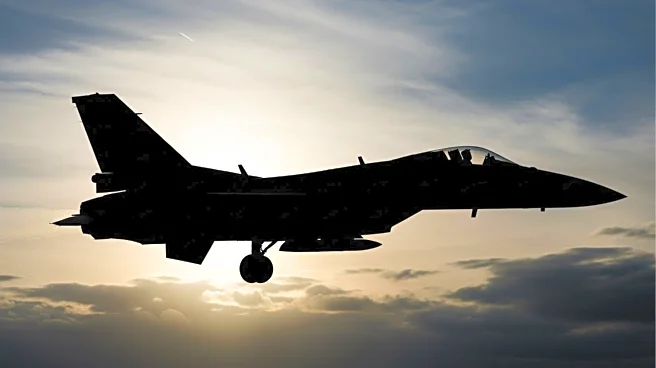What's Happening?
Russian President Vladimir Putin has admitted that Russian air defences were responsible for the downing of an Azerbaijani jetliner in December 2024, which resulted in the deaths of 38 people. The incident occurred when missiles intended to target a Ukrainian drone exploded near the Azerbaijan Airlines plane as it was preparing to land in Grozny, Chechnya. The Embraer 190 jet was hit accidentally by Russian fire and attempted to land in western Kazakhstan, where it ultimately crashed. Putin, speaking at a summit in Dushanbe, Tajikistan, with Azerbaijan's President Ilham Aliyev, pledged to punish those responsible and provide compensation to the victims' families. This admission marks a shift from previous statements where Putin had apologized but did not acknowledge responsibility.
Why It's Important?
The admission by President Putin is significant as it addresses a major diplomatic incident that has strained relations between Russia and Azerbaijan. The crash and subsequent handling of the situation have led to tensions, including criticism from Aliyev regarding Moscow's attempts to downplay the incident. The promise of compensation and legal action against those responsible may help to ease diplomatic tensions and restore relations between the two countries. Additionally, this incident highlights the risks associated with military operations near civilian areas and the potential for tragic accidents, emphasizing the need for improved safety protocols.
What's Next?
Following Putin's admission, the focus will likely shift to the implementation of compensation measures and legal proceedings against those responsible for the incident. Both countries may work towards rebuilding their diplomatic relations, which have been affected by this and other incidents involving ethnic Azerbaijanis in Russia. The international community will be watching closely to see how Russia handles the aftermath of the crash and whether it leads to changes in military engagement protocols to prevent similar occurrences in the future.
Beyond the Headlines
The incident raises broader questions about the safety of civilian air travel in conflict zones and the responsibilities of nations to protect civilian aircraft from military operations. It also underscores the importance of transparency and accountability in international relations, particularly when dealing with tragic events that impact multiple countries. The diplomatic fallout from the crash may influence future negotiations and alliances within the region.









